
Oleksandr Lebid, Military and Political Expert
Recently, the majority of international experts, examining the phenomenon of economic reforms in the People's Republic of China (PRC), focus on the analysis and prediction of changes in macroeconomic parameters of the development of China, the structure of the Chinese economy, its defence sector, as well as Beijing's role in regional and global geopolitical processes. That is they analyze the most visible and tangible manifestations of China's activities in the international arena. At the same time, they often drop out of sight the internal factors that determine the irreversibility of reforms and encourage the development of the overall capacity of the state, which is necessary for China's long-term economic growth.
One of the most important factors is the creation of conditions for stable China creative labor of the working population, as well as decent standards of life of the retired citizens. After years of “socio-economic experiments” over the Chinese people, which had greatly weakened the confidence of citizens in the ability to achieve well-being at the expense of work and self-realization, the Chinese leadership has focused considerable efforts on restoring public confidence in the state.
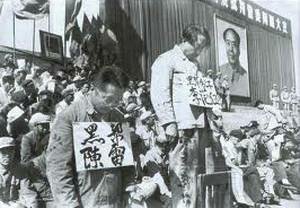 In particular, the rapid development of the Chinese economy over the past three decades was made possible by the China's Communist Party 's abandoning the reactionary internal policy in order to create conditions for a pragmatic combination of communist ideology, traditional Chinese philosophies and principles of the market economy. In 1981, the CPC Central Committee condemned the policy of “cultural revolution” and thereby ensured the legitimacy of the existence of the Communist Party in a market economy.
In particular, the rapid development of the Chinese economy over the past three decades was made possible by the China's Communist Party 's abandoning the reactionary internal policy in order to create conditions for a pragmatic combination of communist ideology, traditional Chinese philosophies and principles of the market economy. In 1981, the CPC Central Committee condemned the policy of “cultural revolution” and thereby ensured the legitimacy of the existence of the Communist Party in a market economy.
At the same time, the Chinese government, intending to prevent possible doubts with respect to the CPC leadership in political, economic and social issues, demonstrated readiness to continue long-term coexistence with the traditional philosophical currents, rooted in modern China many centuries ago. Demonstrating commitment to such intention, Chinese President Jiang Zemin in his speech at the China conference on religious work in 2001, said that in the period of socialism the religion in China should be seen as a massive and long-term phenomenon.
Besides, the restoration of the citizens' trust required special attention to the resolving the problem of corruption in the state apparatus, which was rampant. The difficulty in resolving this problem is the fact that corruption results in citizens' distrust to state bodies and at this corruption is a manifestation of the public servants' being not sure of their own fate. This largely determined the increase in the scale of corruption among public officials who made every effort to ensure the future of their families, taking advantage of their staying in high positions. The roots of corruption were so strong that this phenomenon still exists in Chinese society, despite the tough measures to combat it which have been taken during the time of the reform.
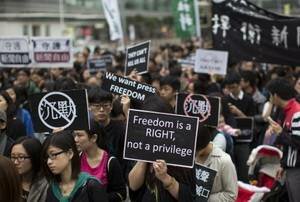 At the same time, against the background of the reform, the increase of the middle class and the rapid development of China, in the Chinese society there is a growing demand for new social relations, which should be based on democratic and generally accepted rules of law. This is confirmed by the results of the parliamentary elections in Hong Kong, held on 4 September 2016. Their way to local parliaments made the candidates associated with the student movement, which in 2014 initiated the protests and demanded the extension of democratic rights, while limiting the influence of the CPC. The presence of such representatives in the regional legislature became possible as a result of the mobilization of voters, whose turnout for the first time since 1997 was 58 %.
At the same time, against the background of the reform, the increase of the middle class and the rapid development of China, in the Chinese society there is a growing demand for new social relations, which should be based on democratic and generally accepted rules of law. This is confirmed by the results of the parliamentary elections in Hong Kong, held on 4 September 2016. Their way to local parliaments made the candidates associated with the student movement, which in 2014 initiated the protests and demanded the extension of democratic rights, while limiting the influence of the CPC. The presence of such representatives in the regional legislature became possible as a result of the mobilization of voters, whose turnout for the first time since 1997 was 58 %.
Besides, in the Chinese blogosphere there are more and more negative statements regarding the scale of the corruption of public servants. At the same time, more often than not, users of social networks are not afraid to voice accusations against the state apparatus and law enforcement agencies of inaction, and their contribution in lawlessness. The absence of qualitative changes, in other words — of the establishment of equality of all citizens before the law, can pose a threat to China's stability and destroy the official Beijing's foreign policy ambitions.
In fact, the Chinese leadership, headed by President Xi Jinping, has faced the vital necessity to create conditions for qualitative changes in the Chinese society in which a person's success would depend not on belonging to this or that clan, but on his abilities, education and adherence to national laws.
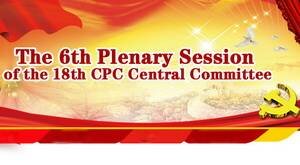 To make China a world leader, the country's government not only continues the large-scale anti-corruption campaign launched in 2013, but also takes new decisive steps to eradicate corruption and establish the rule of law in China.
To make China a world leader, the country's government not only continues the large-scale anti-corruption campaign launched in 2013, but also takes new decisive steps to eradicate corruption and establish the rule of law in China.
In this regard, notable were the results of the 6th Plenum of the CPC Central Committee of the 18th convocation, which took place October 24-27, 2016. At the end of the Plenum, a communiqué was issued which contains the CPC's statement on its intention to strictly deal with violations of the election, first of all, with bribing of voters, as well as with the allocation of posts for material benefits. The basis for such a statement at the Plenum was the approval of “Some Rules and Principles of the Party's Inner Political Life in the New Situation” and “Regulation of the CPC Inner-Control”, aimed at strengthening the party's inner discipline.
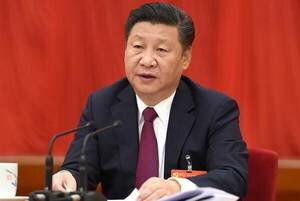 Quite likely, at the initiative of the CPC Central Committee's General Secretary Xi Jinping, they are activating activities, aimed at “coercion” of party leaders to live according to the laws, ensuring transparency of the party organization and elimination of preconditions for possible changes in domestic and foreign policy as a result of inner-party struggle. In order to exclude other possible interpretations and to give even greater weight to the documents approved, Xi Jinping addressed the participants of the Plenum with explanation. According to him, the strengthening of discipline in the CPC is aimed at eradication of party groups, elimination of the conditions making possible political plots in the party, and at forming a corruption-free political environment. During his speech, Xi Jinping emphasized the urgent need to address the problems associated with the abuse of authority by officials, the use of official position for personal gain, lobbying interests of industrial corporations.
Quite likely, at the initiative of the CPC Central Committee's General Secretary Xi Jinping, they are activating activities, aimed at “coercion” of party leaders to live according to the laws, ensuring transparency of the party organization and elimination of preconditions for possible changes in domestic and foreign policy as a result of inner-party struggle. In order to exclude other possible interpretations and to give even greater weight to the documents approved, Xi Jinping addressed the participants of the Plenum with explanation. According to him, the strengthening of discipline in the CPC is aimed at eradication of party groups, elimination of the conditions making possible political plots in the party, and at forming a corruption-free political environment. During his speech, Xi Jinping emphasized the urgent need to address the problems associated with the abuse of authority by officials, the use of official position for personal gain, lobbying interests of industrial corporations.
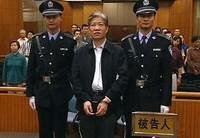 Special attention deserves Xi Jinping's criticism of high-ranking members of the Communist Party, where, among other things, he pointed out the following violations “...acts of individualism, commitment to the cult of money, corruption, waste, separation from the people, tyranny and inaction, breach of the law, sale of positions, formation of intra-party factions”. He said that such violations “...have seriously undermined the unity and the public image of the Party”.
Special attention deserves Xi Jinping's criticism of high-ranking members of the Communist Party, where, among other things, he pointed out the following violations “...acts of individualism, commitment to the cult of money, corruption, waste, separation from the people, tyranny and inaction, breach of the law, sale of positions, formation of intra-party factions”. He said that such violations “...have seriously undermined the unity and the public image of the Party”.
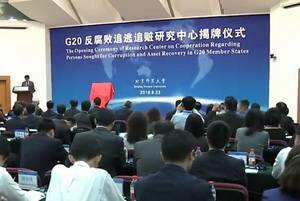 Taking into consideration that serious violations of law due to corruption often involve concealment of illegally of the funds outside of China, the Chinese side has taken steps to deepen the international cooperation in this sphere. September 23, 2016, in Beijing, there was an official opening of the G20 International Anti-Corruption Center. The Centre is to organize the return to China of the people who are convicted or suspected of corruption crimes, and of their financial resources. In this regard, the Center's work will be conducted by experts and lawyers who specialize in the field of fight against corruption. Besides, it is expected that the Center will participate in the development of proposals for the adaptation of the Chinese anti-corruption legislation to the relevant laws of the G20.
Taking into consideration that serious violations of law due to corruption often involve concealment of illegally of the funds outside of China, the Chinese side has taken steps to deepen the international cooperation in this sphere. September 23, 2016, in Beijing, there was an official opening of the G20 International Anti-Corruption Center. The Centre is to organize the return to China of the people who are convicted or suspected of corruption crimes, and of their financial resources. In this regard, the Center's work will be conducted by experts and lawyers who specialize in the field of fight against corruption. Besides, it is expected that the Center will participate in the development of proposals for the adaptation of the Chinese anti-corruption legislation to the relevant laws of the G20.
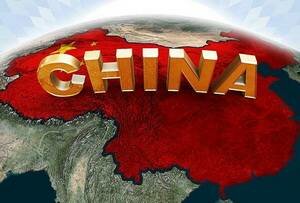 The above-mentioned events provide an opportunity to only partly understand the depth of the evolutionary processes that occur inside the modern China. However, even by them one can judge about the China's leadership's understanding of the need and the will to implement the idea of all Chinese citizens' equality before the law.
The above-mentioned events provide an opportunity to only partly understand the depth of the evolutionary processes that occur inside the modern China. However, even by them one can judge about the China's leadership's understanding of the need and the will to implement the idea of all Chinese citizens' equality before the law.
Intensification of the fight against corruption should be seen as an attempt to create conditions for long-term development and establishment of China as a global superpower. This attempt has a great chance of a positive realization, because Beijing has for this an essential resource, industrial and scientific potential, which gives it a certain freedom to maneuver in the face of the declining global economic growth and possible changes in the military-political situation in the world after D. Trump's victory in the presidential election in the United States.
Therefore, assessing China's future role in international relations, it is extremely important, advisable and necessary to take into consideration how effectively the Chinese leadership will ensure the rule of law.

